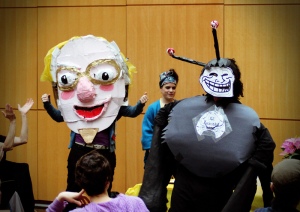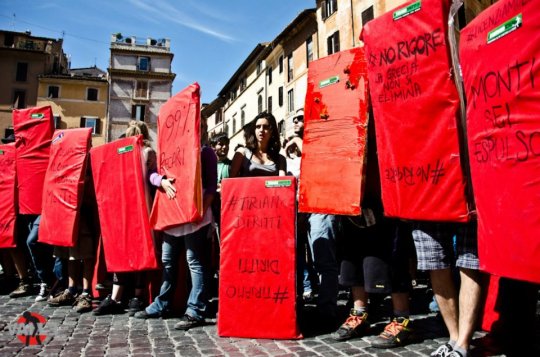Tagged: militant research
Desiring Alliance and Complex Translations in Activist Research: An Interview with Richa Nagar

Sangtin community mobilization (via)
Summary: Reflecting on her activist research with a people’s movement in India, Richa Nagar (Professor of Gender, Women and Sexuality Studies, co-author of Playing With Fire: Feminist Thought and Activism Through Seven Lives in India) shares stories about the importance of developing ethical relationships of trust and affect. Within and against the politics of NGOization and caste divisions, she highlights the roles of imagination, desiring, and translation in intersectional alliance work. From experiencing tensions between her positions as an activist and an academic, she notes common problems of institutionalization in both social movements and the university, and offers guidance for engaging with contradictions while maintaining some sense of security in the margins.
Occupying Our Education
Summary: Drawing on experiences with Occupy CUNY, the Adjunct Project, and teaching an ‘Occupy Class’ at Brooklyn College, Steve M. shares insights into the conditions for organizing around universities today. In the face of the challenges of divisions of race and class between students and workers, and across the segregated city, Steve highlights the potentials for bringing militant co-research into coalitions and into classrooms themselves.
On ‘Service Learning,’ Precarity, and Building the Urban Commons with, against, and beyond Universities
Summary:
An adjunct discusses her experiences with using ‘service learning’ in classes to engage students in militant co-research and community organizing. Such projects can build radical relationships across universities, public schools, and marginalized communities, but require a lot of work – the challenge of building ‘the urban commons.’ Such work must also grapple with the dangers of recuperation in academia. Beyond the university, she discusses her engagement with urban commons in neighborhoods, such as through co-operatives. What kind of advantages and disadvantages does the flexibility of adjunct labor offer? From the position of precarious work and life, how can we organize for mutual aid across our workplaces and communities? Continue reading
Contaminating the University, Creating Autonomous Knowledge: Occupied Social and Cultural Centers in Italy
An Interview with Claudia Bernardi
Summary:
From her experiences creating an occupied social center in Rome, Claudia Bernardi speaks of self-organization and self-education between migrants, students, artists, and other precarious workers. Within the global crisis, these spaces of resistance make common institutions that cross the boundaries of the university and city. As a kind of autonomous study center, the project has intertwined labor union organizing with political movements and knowledge production. Building occupations have spread to include artists and other cultural workers who have squatted cinemas and theaters, making culture as a common good. In a time of proliferating borders and frontiers, we all become migrants, struggling across divisions for shared spaces, culture, and knowledge.
Standing at the interface of academic corporatization and exploitation: why not struggle against the ‘grain’?
by Sutapa Chattopadhyay[1]
[i]t’s increasingly difficult to define what, substantively, it means to be a thinker of the Left
(Castree and Wright 2005: 6)
Not too long back I read two articles on anti-austerity protest and Quebec student strikes that were published by ClassWarU, and a few others, mostly by activist student scholars. Almost all the articles and interviews that have been published so far in this website pertinently point out the urgent need to employ alternative pathways to connect people, participation and place. There is little to no doubt that the question of happiness and wellbeing is overwhelmingly difficult to answer, as it is ensnared by the laws of neoliberal capitalist accumulation, under continuous and progressive expropriation to the creation of hierarchies and hegemonies (through continuous division of labor along sex, race, class, religion, education, and nationality) to constant production of all forms of social exclusion. The poor and middle classes have shouldered the heaviest burdens of the global political obsession with austerity policies over the past five to six years. In the United States, budget cuts have forced states to reduce education, public transportation, affordable housing, health and other social services. In Europe, welfare cuts have driven some severely disabled individuals to fear for their lives. Austerity is still the order of the day and the struggle against austerity is an all-class war orchestrated in plazas, universities, parks, streets, squares, or any public places that we can think of. This article holds my deep reactions on academic exploitation at the crossing point of other kinds of exploitation that have burgeoned as a response to neoliberal capitalism. Continue reading
Mapping Shared Imaginaries for Anti-capitalist Movements: an Interview with Tim Stallmann of the Counter-Cartographies Collective
Summary: Tim shares his experiences of militant research with university workers and students, making disOrientation Guides, and the importance of starting from your own position for building solidarity. Reflecting on the Queen Mary Counter/mapping project and community-based cartography, he discusses the challenges of map-making collectively, as well as the benefits of the process for building a plane of commonality for struggles. Against the individualizing and recuperative functions of academia, he shares some thoughts on how we can better traverse the tensions our movements face across the boundaries of universities and communities.



